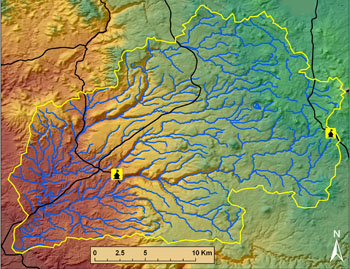|
|
 Submitted
January 5, 2007
Submitted
January 5, 2007
Laura Huenneke, Lead Scientist
Dean, College of Engineering and Natural Sciences,
James Allen
Associate Director, School of Forestry,
Northern Arizona University
Carl Edminster
Project Leader, USDA Forest Service Rocky Mountain Research Station,
Flagstaff
|
| |
The Beaver Creek Watershed
(BCW) is located in the southwest portion of Domain 13 (Figure
1). The watershed lies 80 km south of Flagstaff in the Central
Arizona Highlands, at the transition between the Basin and
Range and Colorado Plateau physiographic provinces. Beaver
Creek is one of several drainages that dissect the Mogollon
Plateau and drain into the Verde River. The watershed is
a natural ecological laboratory, providing habitats for a
wide variety of flora and fauna. Beaver Creek is a UNESCO
Man and the Biosphere Reserve and a designated US
Forest Service Experimental Watershed. The experimental watershed
was established to function as a major center for watershed
management research.
The BCW is an exemplary core site for five key reasons:
1) Characteristic
of Domain 13 (vegetation, climate, soils, hydrology)
2) Ideal for
supporting both terrestrial and aquatic research to address the two focal NEON
drivers, climate change
and land use
3) Available
regional expertise, laboratories, and complementary research to
ensure leveraging of NEON funds
4) Institutional
support and availability of
facilities
5) Strong
legacy of research that NEON can build upon
Thus, the BCW has many of the critical elements required for a core site to be
successful, and
together with other core sites, would realize the national-scale observatory
network for monitoring ecological dynamics.
|
|




